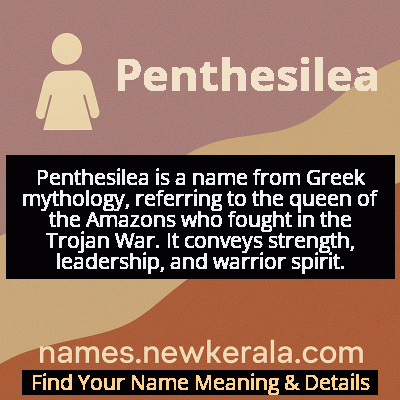Penthesilea Name Meaning & Details
Origin, Popularity, Numerology Analysis & Name Meaning of Penthesilea
Discover the origin, meaning, and cultural significance of the name PENTHESILEA. Delve into its historical roots and explore the lasting impact it has had on communities and traditions.
Name
Penthesilea
Gender
Female
Origin
Greek
Lucky Number
6
Meaning of the Name - Penthesilea
Penthesilea is a name from Greek mythology, referring to the queen of the Amazons who fought in the Trojan War. It conveys strength, leadership, and warrior spirit.
Penthesilea - Complete Numerology Analysis
Your Numerology Number
Based on Pythagorean Numerology System
Ruling Planet
Venus
Positive Nature
Harmonious, responsible, caring, and artistic.
Negative Traits
Overly idealistic, superficial, possessive, or jealous.
Lucky Colours
Pink, turquoise.
Lucky Days
Friday.
Lucky Stones
Diamond, turquoise.
Harmony Numbers
2, 3, 9.
Best Suited Professions
Artists, musicians, teachers, healthcare workers.
What People Like About You
Warmth, nurturing nature, artistic flair.
Famous People Named Penthesilea
Penthesilea (Mythological)
Amazon Queen
Led Amazon warriors in the Trojan War and fought Achilles
Penthesilea (Literary Character)
Theatrical Character
Featured in Heinrich von Kleist's 1808 drama 'Penthesilea'
Penthesilea (Operatic Character)
Opera Character
Title character in Othmar Schoeck's 1927 opera 'Penthesilea'
Name Variations & International Equivalents
Click on blue names to explore their detailed meanings. Gray names with will be available soon.
Cultural & Historical Significance
The cultural significance of Penthesilea extends beyond ancient times into Renaissance art, where she became a popular subject depicting female virtue and strength. During the 19th century, her story experienced a revival in German literature and opera, particularly in Heinrich von Kleist's dramatic reinterpretation that explored psychological depth and romantic tragedy. In contemporary times, she has become an important feminist icon, representing female autonomy, strength, and the right to participate in domains traditionally reserved for men. Her enduring appeal lies in the complexity of her character—both destroyer and destroyed, both warrior and woman, both triumphant and tragic.
Extended Personality Analysis
The name Penthesilea evokes a personality characterized by extraordinary strength, fierce independence, and natural leadership abilities. Those bearing this name are often perceived as possessing an innate authority and confidence that inspires both respect and admiration. They typically demonstrate remarkable resilience in facing challenges and a protective instinct toward their loved ones or causes they champion. The mythological association suggests someone who is unafraid to enter difficult battles, whether literal or metaphorical, and who possesses the courage to stand against overwhelming odds.
Beneath this formidable exterior, however, lies a complex emotional landscape. Like the Amazon queen herself, individuals with this name may experience deep passions and vulnerabilities that contrast with their public strength. They often embody the paradox of being both warrior and compassionate being, capable of great ferocity in pursuit of their goals while also possessing profound emotional depth. This combination can make them intensely compelling figures who leave lasting impressions on those they encounter. Their determination, while one of their greatest strengths, can sometimes manifest as stubbornness or an unwillingness to retreat from lost causes, reflecting the tragic dimensions of their namesake's story.
Modern Usage & Popularity
In contemporary naming practices, Penthesilea remains an exceptionally rare choice, typically selected by parents with strong classical education backgrounds, interests in mythology, or those seeking a name with powerful feminist connotations. The name's usage is predominantly confined to intellectual and artistic circles where its mythological significance is appreciated. In countries with stronger classical traditions like Greece, Italy, and Germany, it appears slightly more frequently, though still uncommon. The name faces practical challenges in modern usage due to its length, complexity, and strong association with a specific mythological narrative. However, in an era increasingly open to unique and meaningful names, Penthesilea represents the ultimate statement name for parents wanting to celebrate female strength and classical heritage. Its usage patterns show it's more likely to be chosen by families valuing education, cultural literacy, and gender equality, making it a name that communicates specific values and intellectual orientation.
Symbolic & Spiritual Meanings
Penthesilea embodies rich symbolic meanings that transcend her mythological origins to represent broader human experiences. She symbolizes the warrior spirit in feminine form—the idea that strength, courage, and leadership are not gendered qualities but human ones. Her story represents the tragic beauty found in doomed causes and the nobility of fighting for what one believes in, regardless of the outcome. The name carries the symbolic weight of 'compelled mourning,' suggesting a destiny intertwined with loss and the understanding that great achievements often come with significant personal cost.
Metaphorically, Penthesilea represents the complex interplay between love and war, attraction and opposition, that defines many human relationships. Her fatal encounter with Achilles has been interpreted as symbolizing the idea that our greatest adversaries sometimes understand us most deeply, and that recognition and respect can flourish even in conflict. She also serves as a symbol of female autonomy and the right of women to determine their own destinies, making her an enduring figure in feminist reinterpretations of classical mythology. The name ultimately represents the paradox of human experience—that our greatest strengths and deepest vulnerabilities are often inextricably linked.

